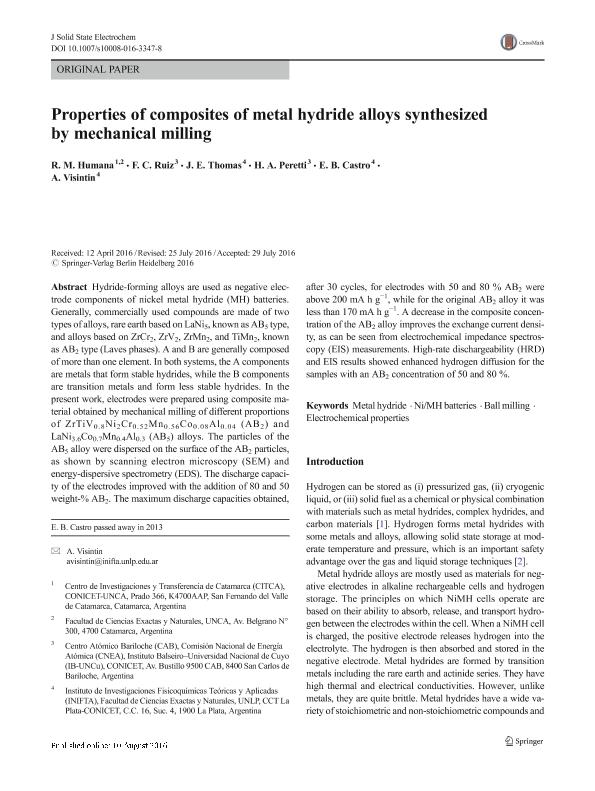Artículo
Properties of composites of metal hydride alloys synthesized by mechanical milling
Humana, Rita Mariangeles ; Ruiz, Fabricio Carlos
; Ruiz, Fabricio Carlos ; Thomas, Jorge Enrique
; Thomas, Jorge Enrique ; Peretti Hollemaert, Hernán Américo; Castro, Elida Beatriz
; Peretti Hollemaert, Hernán Américo; Castro, Elida Beatriz ; Visintin, Arnaldo
; Visintin, Arnaldo
 ; Ruiz, Fabricio Carlos
; Ruiz, Fabricio Carlos ; Thomas, Jorge Enrique
; Thomas, Jorge Enrique ; Peretti Hollemaert, Hernán Américo; Castro, Elida Beatriz
; Peretti Hollemaert, Hernán Américo; Castro, Elida Beatriz ; Visintin, Arnaldo
; Visintin, Arnaldo
Fecha de publicación:
01/2017
Editorial:
Springer
Revista:
Journal of Solid State Electrochemistry (print)
ISSN:
1432-8488
Idioma:
Inglés
Tipo de recurso:
Artículo publicado
Clasificación temática:
Resumen
Hydride-forming alloys are used as negative electrode components of nickel metal hydride (MH) batteries. Generally, commercially used compounds are made of two types of alloys, rare earth based on LaNi5, known as AB5 type, and alloys based on ZrCr2, ZrV2, ZrMn2, and TiMn2, known as AB2 type (Laves phases). A and B are generally composed of more than one element. In both systems, the A components are metals that form stable hydrides, while the B components are transition metals and form less stable hydrides. In the present work, electrodes were prepared using composite material obtained by mechanical milling of different proportions of ZrTiV0.8Ni2Cr0.52Mn0.56Co0.08Al0.04 (AB2) and LaNi3.6Co0.7Mn0.4Al0.3 (AB5) alloys. The particles of the AB5 alloy were dispersed on the surface of the AB2 particles, as shown by scanning electron microscopy (SEM) and energy-dispersive spectrometry (EDS). The discharge capacity of the electrodes improved with the addition of 80 and 50 weight-% AB2. The maximum discharge capacities obtained, after 30 cycles, for electrodes with 50 and 80 % AB2 were above 200 mA h g−1, while for the original AB2 alloy it was less than 170 mA h g−1. A decrease in the composite concentration of the AB2 alloy improves the exchange current density, as can be seen from electrochemical impedance spectroscopy (EIS) measurements. High-rate dischargeability (HRD) and EIS results showed enhanced hydrogen diffusion for the samples with an AB2 concentration of 50 and 80 %.
Palabras clave:
BALL MILLING
,
ELECTROCHEMICAL PROPERTIES
,
METAL HYDRIDE
,
NI/MH BATTERIES
Archivos asociados
Licencia
Identificadores
Colecciones
Articulos(INIFTA)
Articulos de INST.DE INV.FISICOQUIMICAS TEORICAS Y APLIC.
Articulos de INST.DE INV.FISICOQUIMICAS TEORICAS Y APLIC.
Articulos(SEDE CENTRAL)
Articulos de SEDE CENTRAL
Articulos de SEDE CENTRAL
Citación
Humana, Rita Mariangeles; Ruiz, Fabricio Carlos; Thomas, Jorge Enrique; Peretti Hollemaert, Hernán Américo; Castro, Elida Beatriz; et al.; Properties of composites of metal hydride alloys synthesized by mechanical milling; Springer; Journal of Solid State Electrochemistry (print); 21; 1; 1-2017; 153-160
Compartir
Altmétricas



